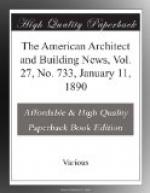The profession in Brooklyn, N.Y., has to mourn the loss of Mr. Charles Keely, son of Mr. Peter C. Keely, the architect of so many Catholic churches all over the country, and associated with his father in business. The practice of the office is enormous, fifty churches, it is said, being sometimes in process of execution from the designs of the father and son, and of the excellent work done there, no doubt much was due to the younger man’s talent. Mr. Keely was about thirty-five years of age, active and popular. He died of pneumonia in Hartford, at the house of the bishop, whom he was visiting on business.
* * * * *
A deputation was presented to the Ways and Means Committee of Congress the other day from the Free Art League, which urged the abolition of the present duty on foreign works of art. The deputation consisted of Mr. Carroll Beckwith and Mr. Kenyon Cox, with Mr. William A. Coffin, who, after mentioning some of the obvious reasons for abolishing the tax, stated that, in response to a circular sent out by the League, fourteen hundred and thirty-five communications were received from artists, teachers of art and others whose opinion would be of value. Of these, thirteen hundred and forty-five desired the immediate abolition of the duty, eighty-three favored a moderate duty, ten per cent being mentioned by twenty-eight out of the number and seven wished the present impost retained. The Ways and Means Committee, according to the newspapers, listened politely to the artists for a time, and then turned their attention to the duty on carbonate of soda. Whether, in the presence of practical matters like carbonate of soda, they will ever, think again of the tax on mere works of art, remains to be seen.
* * * * *
Fire and Water says, referring to some remarks of ours about the policy of transferring the fire-extinguishing apparatus of small towns to any neighboring large one in which a serious conflagration happens to break out, that we were mistaken in “supposing” that the insurance companies might refuse to pay losses in suburban towns occurring during the temporary absence of the regular protective apparatus, and that as the contract of insurance does not mention anything of the kind, the companies would be compelled to pay losses, whatever happened to the engines, so long as their policies remained uncancelled. Now, in the first place, we did not “suppose” or “assert,” as another paper says we did, anything about the matter. We simply said we had been told that the companies would not pay in such cases, which was true. We were told that, and by an insurance agent, who ought to know something about it. Moreover, this was not the first time we have heard the same thing. Not long ago, in a discussion in the city government of a town near Boston, one of the members protested against allowing the town engines to leave the limits of the municipality,




